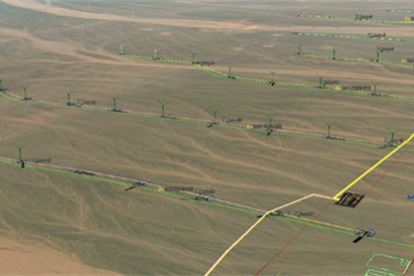DESERT OFFICERS DRAW A LINE IN THE SAND
In addition to guarding the border, officers at a remote settlement serve as postmen, deliverymen, news reporters and even barbers. Zhao Yimeng reports from Ejine Banner, Inner Mongolia autonomous region.

Editor's note: This is the third in a series of stories about China's border guards, focusing on the challenges they face and their work to keep the country safe, prevent trafficking of drugs and people, and maintain friendly relations with their counterparts in neighboring countries.
On the night of Oct 17, border officer Ochir and three colleagues packed their bags at the Suanjingzi Border Control Police Station in Alshaa League's Ejine Banner, Inner Mongolia autonomous region. In the region, a league is equal to a city, while a banner is an administrative area similar to a county.
One officer, named Altantsooj, gently placed a small pebble in his suitcase. He had picked it up on a 1,100-meter hill-nicknamed Mount Dahong by the officers-in the desert as a memento of his 18 months at the station.
The next day, Ochir and his peers left the settlement in the middle of the Badain Jaran Desert, which forms part of the Gobi Desert, and moved to stations nearer the China-Mongolia border.
"Although we didn't handle major cases like smuggling or drug trafficking, we have patrolled every inch of this desert. I will definitely miss this place," said Ochir, 33, who was deputy director of the station in Suanjingzi. Like many members of the Mongolian ethnic group, he only uses one name.
The work at Suanjingzi is not as dangerous as at some other border stations; instead, each officer's main mission is to help his peers and the local herders in the extreme environment.
The day before they left, Ochir and his colleagues visited Soyoltuya, a 68-year-old herder. In 2016, the officers built a yurt for her as part of a resettlement program. To make it easier to provide assistance, they built the structure close to the police station.
Assistance
Soyoltuya was initially unwilling to leave her home deep in the desert. However, she lives alone and has rheumatoid arthritis, which means she is often confined to bed, so Ochir insisted she move nearer the station.
"He persuaded me by saying, 'Mother, you are so far away from your son'," Soyoltuya said, using the affectionate terms by which local people refer to each other.
"I compromised, but refused to move into a house next to the police station. That would have caused the officers a lot of extra work because they would have felt obliged to visit me frequently. This yurt is close enough for them to visit if needed."
She used to graze 400 goats on her pasture. On one occasion, when the officers arrived to help move them to the summer grazing ground, the goats got spooked and fled. Some ran into the desert, so Ochir and another officer followed them. However, they did not take any water along, so they risked severe dehydration. Moreover, the weak phone signal meant the other officers were unable to contact them.
Everyone was on tenterhooks until the two men emerged from the desert late in the evening. "They returned really late, bringing my goats with them. I worried about their safety so much," Soyoltuya said.
In July 2017, to relieve Soyoltuya's burden after she had settled down in the yurt, the officers helped find a buyer for her goats and sold the entire herd for 100,500 yuan ($14,300). They placed the money in her bank account.
"My son is addicted to gambling, so please keep my money safe," Soyoltuya told Ochir as she handed him her bank card.
When Ochir bade farewell to Soyoltuya on his last day at Suanjingzi, he squeezed her hand and urged her to take care.
"I hope my 'son' has a bright future. Keep serving the people in other areas, helping those in need and maintaining a close relationship with the residents," Soyoltuya said with a smile.
Developments
Stationed in the far west of Alshaa League, the 11 officers at the Suanjingzi Border Police Station serve fewer than 100 herders across 9,400 square kilometers.
The center of the banner is 309 km from the station. The journey features 60 km of dirt road carpeted with rubble, followed by a long stretch of the G7 Beijing-Urumqi Expressway. During the five-hour drive, the desert scenery is simple and repetitive.
Before the Inner Mongolia section of the expressway opened to traffic in 2017, it took an entire day to drive to the police station from the county center in an SUV, said Bai Yongquan, director of the Border Inspection Station at Ejine Banner.
Suanjingzi residents describe the desert as a place where "no birds fly in the sky, and no grass grows on the ground".
Herder Dandar and his wife Dashmaa live in the desert. They were not surprised to see Ochir's car stop outside their house, even though they had not been warned.
"The officers often visit us, bringing medicine, vegetables and companionship," said Dashmaa, a 68-year-old with rheumatoid arthritis.
The officers' duties go far beyond simply ensuring border security and the herders' safety; in addition to bringing the latest news to isolated homes, they serve as cleaners, postmen, cooks, barbers and technicians.
Along with providing daily necessities for Dandar and Dashmaa, they helped maintain the senior couple's sheepfold, fix their pickup truck and carry soil to fill their small garden.
When Ochir told them he was leaving, the seniors were proud to hear their "son" had been promoted.
They walked outside to watch as Ochir left their small house for the last time. Halting, Dandar suddenly covered his eyes with his hand and sobbed silently. Ochir patted the old man's thin shoulders and gave him a comforting smile.
"Their children are not around, and we officers are too far from our families to take care of our parents, so we treat each other as parents and children," Ochir said, tears welling in his eyes.
During his nine years at Suanjingzi, the greatest enemy has not been the primitive lifestyle and limited facilities, but the endless loneliness all the officers endure.
However, their living conditions have improved since the police station was connected to the national electricity grid at the end of 2016, and transportation has become more convenient in recent years. Meanwhile, exercise equipment and a basketball court have been installed in front of the station.
"Now, the toughest problem is not at the material level. The battle with solitude is so challenging for the officers, especially the younger generation," Ochir said.
Altantsooj added: "Life is monotonous in this isolated spot with so few people. During a recent visit to Beijing I heard people my age talking about their travel experiences and felt as though I was lagging behind them."
Commemoration
The officers often lift their spirits by climbing to the summit of Mount Dahong.
Covered by black and brown gravel, the road to the top was originally explored by guards who were sent to the area when the police station was established in 1971.
The hillside bears more than 100 names and several slogans written in pebbles to commemorate some of the officers who have served at the station.
Bao Cheng, the station's political adviser in the 1980s, was the first to place his name on the hill. In those days, the postal service was so poor that he received two letters from his girlfriend on the same day-the first announced an upcoming visit and the second informed him that she was ending their relationship.
Few of the original officers still live in the area, but their names remain on the hill to commemorate their efforts in the Gobi Desert, Ochir said.
"They remind us of our predecessors' contribution to the country, made under much harsher living conditions. We can't ruin the legacy they left: the police station and their perseverance," he added.
In 1999, officers and herders could only contact each other by telegram, but three years later, satellite phones enabled them to stay in touch and reach the outside world. In 2008, the arrival of GSM (The Global System for Mobile Communications) opened a new chapter in communications.
Now, the station's entire area of jurisdiction is covered by China's 4G network.
Ochir and his three colleagues were sad to be leaving the station, but they were pleased to see life steadily improving for their peers and the herders in Suanjingzi.
They have moved to other stations, either because they have been promoted or they wish to be closer to their families.
As he left Soyoltuya's yurt, Ochir offered the senior a parting gift; if his "mother" agreed, he would hold on to the bankcard she had entrusted to him and help her save so she could buy a house in the center of Ejine Banner.
Soyoltuya was happy to agree.





Today's Top News
- Stellar Olympic performances spark craze for emerging sports
- US must respect China's core interests on Taiwan
- Adjustments to monetary policies eyed
- Xi extends congratulations to new president of Lebanon
- New quality productive forces revitalize 'old' sectors
- China, EU urged to build on past achievements






























